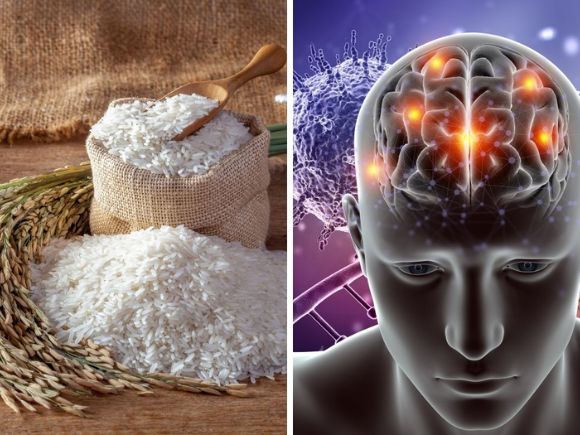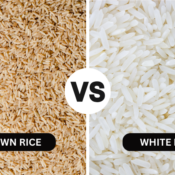
How Rice Can Boost Your Brain Power
Rice is one of the most commonly consumed foods worldwide, particularly in Asian countries where it forms a significant part of the daily diet. While rice is often associated with providing energy due to its carbohydrate content, it offers much more than just fuel for the body. In fact, rice—especially varieties like brown rice—can play a role in boosting brain power and improving cognitive function. But how exactly does this humble grain impact your brain health?
In this blog, we will dive into the science behind how rice supports brain function, the key nutrients it provides, and the specific benefits it offers for your brain.
The Nutritional Content of Rice: Fueling the Brain
Rice, particularly brown rice, is packed with essential nutrients that are crucial for brain health. The brain, which makes up around 2% of your body weight, requires about 20% of your body’s energy supply to function optimally. It relies heavily on glucose (derived from carbohydrates) for energy. Here’s a closer look at how rice helps support brain function:
Complex Carbohydrates for Sustained Energy:
o Rice, especially whole-grain varieties like brown rice, is an excellent source of complex carbohydrates. Unlike simple carbs found in sugary foods, complex carbs are broken down slowly by the body, providing a steady and sustained release of energy. This steady supply of glucose is essential for maintaining concentration, focus, and mental alertness throughout the day.
o White rice also provides carbohydrates, but due to its higher glycemic index, it may cause rapid fluctuations in blood sugar, which could lead to energy crashes and impair cognitive performance.
Rich in B-Vitamins:
o Brown rice, in particular, is rich in B-vitamins like B1 (thiamine), B3 (niacin), and B6 (pyridoxine). These vitamins are crucial for brain health, as they help convert carbohydrates into glucose, which is the brain’s primary source of energy. Thiamine, for example, plays a key role in nerve function and cognitive performance. A deficiency in B-vitamins can lead to fatigue, poor memory, and cognitive impairment.
o Additionally, B-vitamins contribute to the synthesis of neurotransmitters, which are chemicals that transmit signals between brain cells. This process is essential for memory, mood regulation, and focus.
Magnesium for Brain Function:
o Rice, especially brown rice, is a good source of magnesium, a mineral that plays a pivotal role in brain health. Magnesium helps support the transmission of nerve signals, regulates blood flow to the brain, and plays a role in memory and learning. Studies have shown that adequate magnesium intake can improve cognitive function, reduce stress, and even enhance the brain’s ability to adapt and form new memories.
o Low magnesium levels have been linked to increased anxiety, poor sleep, and cognitive decline, highlighting the importance of this nutrient for optimal brain function.
Antioxidants to Protect Brain Cells:
o Brown rice contains antioxidants, such as phenolic acids and flavonoids, which help protect brain cells from oxidative stress and inflammation. These antioxidants neutralize harmful free radicals that can damage cells, including those in the brain. Chronic oxidative stress has been associated with neurodegenerative diseases like Alzheimer's and Parkinson’s.
o By consuming foods rich in antioxidants, such as brown rice, you can help protect your brain cells and support long-term cognitive health.
How Rice Enhances Cognitive Function
In addition to providing essential nutrients, rice also offers several specific benefits that support cognitive function:
Improved Memory and Learning:
o The brain requires a continuous supply of glucose to function at its best. Complex carbohydrates in brown rice ensure that the brain gets a steady and sustained supply of glucose, which is essential for memory and learning. Studies have shown that consuming complex carbs, like those found in brown rice, supports cognitive tasks, improves memory retention, and enhances the brain’s ability to learn and process information.
o In fact, research has found that diets rich in whole grains like brown rice are associated with better cognitive performance in both the short-term and long-term.
Enhanced Focus and Concentration:
o Brown rice’s complex carbohydrates help maintain stable blood sugar levels throughout the day, preventing the energy crashes that can impair concentration. By stabilizing blood sugar levels, rice helps improve mental clarity, focus, and overall productivity.
o This makes rice an ideal food for students, professionals, and anyone who needs to stay mentally sharp for long periods of time.
Reduced Brain Fatigue:
o Magnesium, found in abundance in rice, has a calming effect on the nervous system. It helps reduce stress and anxiety, which are often associated with cognitive fatigue. By keeping the nervous system balanced, magnesium ensures that the brain operates efficiently without feeling overwhelmed.
o Chronic stress is a major contributor to cognitive decline and can make it difficult to concentrate or retain information. The magnesium in brown rice helps combat these effects by relaxing the body and promoting restful sleep, which is crucial for memory consolidation and cognitive recovery.
Mood Stabilization:
o The B-vitamins in rice help regulate the production of neurotransmitters like serotonin and dopamine, which are involved in mood regulation. A lack of these neurotransmitters is linked to mood disorders such as depression and anxiety. By ensuring adequate levels of B-vitamins, rice can contribute to emotional well-being and help prevent cognitive decline related to mental health issues.
o In addition, magnesium has been shown to alleviate symptoms of depression and anxiety, further supporting its role in brain health.
The Role of Rice in Preventing Cognitive Decline
As you age, maintaining brain health becomes increasingly important. The antioxidants and nutrients found in rice can play a role in slowing cognitive decline and preventing age-related neurological diseases. Consuming rice as part of a balanced diet rich in antioxidants and nutrients supports brain aging, helps preserve cognitive function, and may reduce the risk of conditions like Alzheimer's and dementia.
Conclusion: Rice as a Brain-Boosting Superfood
Rice is often overlooked as a brain-boosting food, but when consumed, especially in its whole grain form, it offers numerous benefits for brain health. Brown rice, with its complex carbohydrates, B-vitamins, magnesium, and antioxidants, is a powerful ally in enhancing memory, concentration, and overall cognitive function.
Whether you're a student, a professional, or simply someone looking to maintain brain health as you age, rice can be a valuable addition to your diet. By making rice a regular part of your meals, you're providing your brain with the essential nutrients it needs to perform at its best.
Incorporate this staple grain into your meals, and give your brain the boost it deserves!




